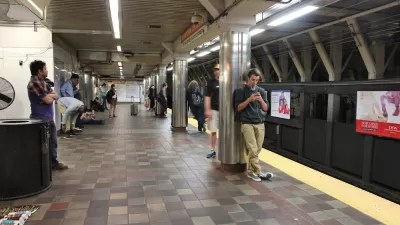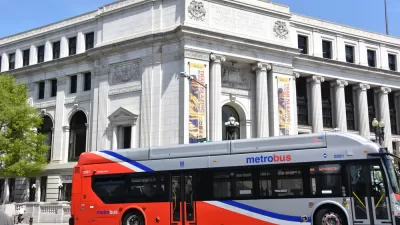A pilot project to extend the operating hours of Boston's subway system until 3 a.m. on weekends is being celebrated by riders, businesses leaders and public officials as a crucial element in maintaining a vibrant and attractive city.
To attract the talented young adults that are revitalizing America's cities, vibrant nightlife is essential. For cities wishing to cultivate their late-night scene, that means providing opportunities for partiers and employees to get home when the bars and clubs close without driving. Hence the motivation for Boston's political and business leaders to push for expanding the operating hours of the city's transit system.
"Boston is one of the few major cities in the United States where service barely inches past midnight: transit systems in New York, Chicago, and parts of Philadelphia run 24 hours, while Washington, D.C., has weekend service until 3," observes Martine Powers. "The addition of the later service in Boston will put employers on better footing when it comes to recruiting, especially in the technology sector."
“The biggest inhibitor to growth in the tech sector is our ability to attract and maintain talent,” said Tom Hopcroft, chief executive of the Massachusetts Technology Leadership Council. “There’s a big talent war going on, and New York and Silicon Valley are more appealing to young people. . . . There’s not a ton that’s holding them here, and oftentimes, it may be how fun and appealing the area is.”
“A vibrant economy demands a public transit system that caters to the residents, students and tourists it serves,” Governor Deval Patrick told The New York Times. “Extending service on weekend evenings will allow the public to enjoy the many attractions and restaurants the region has to offer and give workers a more cost-effective option for getting home late at night.”
FULL STORY: T’s late-night service plan could be arriving right on time

Planetizen Federal Action Tracker
A weekly monitor of how Trump’s orders and actions are impacting planners and planning in America.

Map: Where Senate Republicans Want to Sell Your Public Lands
For public land advocates, the Senate Republicans’ proposal to sell millions of acres of public land in the West is “the biggest fight of their careers.”

Restaurant Patios Were a Pandemic Win — Why Were They so Hard to Keep?
Social distancing requirements and changes in travel patterns prompted cities to pilot new uses for street and sidewalk space. Then it got complicated.

Platform Pilsner: Vancouver Transit Agency Releases... a Beer?
TransLink will receive a portion of every sale of the four-pack.

Toronto Weighs Cheaper Transit, Parking Hikes for Major Events
Special event rates would take effect during large festivals, sports games and concerts to ‘discourage driving, manage congestion and free up space for transit.”

Berlin to Consider Car-Free Zone Larger Than Manhattan
The area bound by the 22-mile Ringbahn would still allow 12 uses of a private automobile per year per person, and several other exemptions.
Urban Design for Planners 1: Software Tools
This six-course series explores essential urban design concepts using open source software and equips planners with the tools they need to participate fully in the urban design process.
Planning for Universal Design
Learn the tools for implementing Universal Design in planning regulations.
Heyer Gruel & Associates PA
JM Goldson LLC
Custer County Colorado
City of Camden Redevelopment Agency
City of Astoria
Transportation Research & Education Center (TREC) at Portland State University
Camden Redevelopment Agency
City of Claremont
Municipality of Princeton (NJ)





























